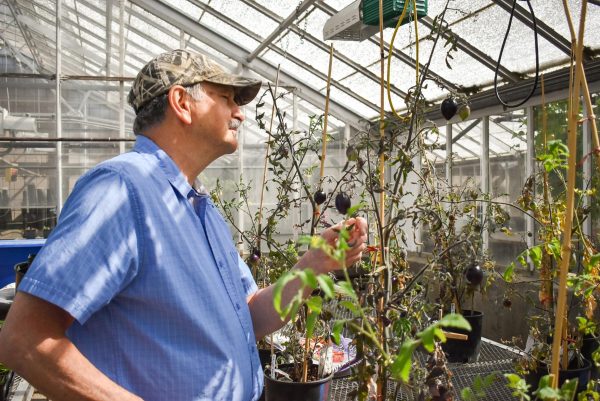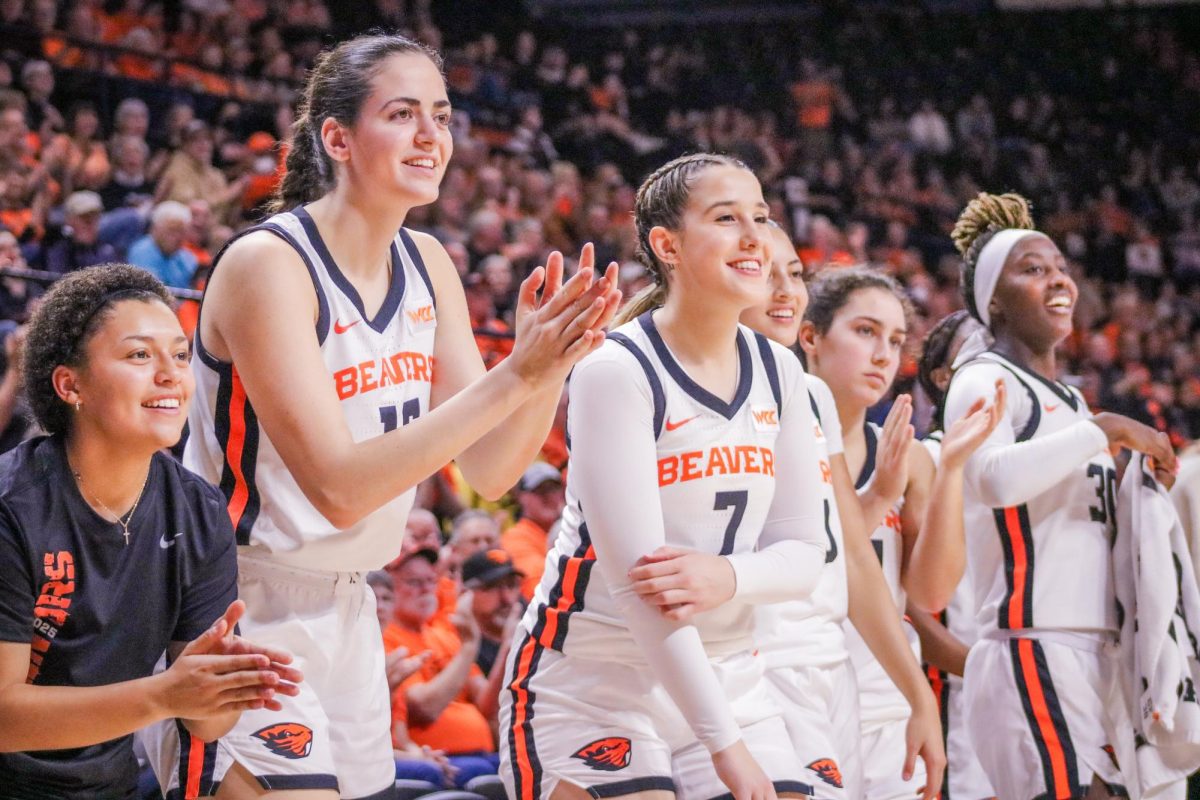The last time you walked into a grocery store in search of tomatoes you probably saw a medley pack with red, yellow and purple cherry tomatoes. What you might not know is that those indigo tomatoes were developed close to home, at Oregon State University.
The purple variety of tomato was not made commercially available until the 2000s when Professor Jim Myers of OSU started to manufacture it for production.
The indigo rose tomato grows in the OSU campus greenhouses and Myers is working on bringing the deep indigo purple color beneath just the skin layer – it currently just sits on the outside and the inside can be different colors, from green to red.
Myers, the Baggett-Frazier Vegetable Breeder Professor at OSU, who also teaches undergraduate and graduate classes, is set to retire this year.
The vegetable breeder role was made to help OSU use its research ability to help farmers and the general public have access to hardier and more diverse strains of vegetables and fruits.
He was in his position for 28 years and has created 20 cultivar and one germplasm different variants of just peppers among many other plants, grown multiple species of plants just for a lab class and taught three other classes in his tenure.
Myers was introduced to nature from a young age through his father, who was a biology teacher.
“I’ve always been very focused primarily on the natural world. We lived in Missouri. (My father) studied bats, so I started caving before I could even walk, actually, on his back, going into caves and helping him on field trips with the students,” Myers said.
He switched his major five times as it became clear that he wanted to study plants and graduated with a degree in horticulture from Kansas State University. With a graduate degree, PhD and postdoctoral, Myers worked at the University of Idaho as a dry bean breeder and released 14 cultivators there.
He worked with colleagues in Eastern and Southern Africa to continue developing dry beans. During those projects, Myers became the third ever Baggett-Frazier professor at OSU.
He has since developed pea varieties, helped create beans that are more tolerant against certain diseases and has worked to develop crop varieties specifically for organic farmers and for chefs in more recent years.
“In the meantime, people use our germ plasm to create additional varieties and there are more than 50 varieties out there,” Myers said.
The impact of the varieties that he and his team are working to produce will have impacts centuries from now. The popping beans that he is developing have the possibility of replacing fast food baked bean powder as a more healthy but still efficient option.
The beans can be put in the microwave right out of their dried form, popped for a few minutes, and then can be soaked and made into baked beans. It removes the portion of steps needed previously to make beans into a rehydrating powder.
“These projects take a long time. It takes about 10 years really, from the time you make a cross, to release something. The impact beyond usually isn’t felt with that first release, but what others do with it, and incorporating it into something people really value,” Myers said.

Myers’ impact locally has had a huge range as well. He was awarded the 2024 F. E. Price/Agricultural Research Foundation Award for Excellence in Research in recognition of his work with OSU. The award goes to one person from any department within OSU each year.
“Jim is really humble. He’s a very quiet, introverted and humble person. So my job has been really nice because what I do is a lot of promotion of his work. He’s not going to run around screaming at the rooftop about how great it is, but I can,” said Lane Selman, assistant professor of practice at OSU.
Selman has worked with Myers for 15 years. Her role is mostly outreach and marketing, so she has worked with him on projects such as the Culinary Breeding Network and the Northern Organic Variety Improvement Collaborative, which is a program that works with organic farmers
She works to connect people with Myers and put his work out in the open. One of the programs that helps do that is the CBN, which connects chefs to Myers so they can both workshop his vegetable varieties as they are developed.
A more recent development is two species of habanero peppers, named “Mild Thing” and “Notta Hotta,” named by Nikki Guerrero of Hot Momma Salsa in Portland, Ore. These variants of peppers have taken out the spice and have been used for sorbet and sodas by chefs through the CBN.
Myers has been recognized across the world for his dedication to plants and people, but he also spends much time and effort to provide his students with help and a great education even in his smaller classes.
He said that the labs are typically taught through observing different pepper variants. He starts planning for the fall class in January when he begins to plant the peppers in sequence so they will be ready in different weeks for his labs.
Myers plans to take a few years to close out some of his projects he is currently working on with graduate and undergraduate students. He is working on finishing up some varieties that are not on the market yet, but still in development such as snap peas, winter squash and summer squashes among others.











































































































